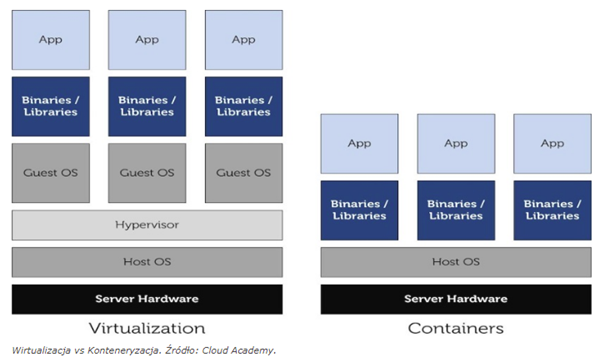Server virtualization and Docker: A modern approach to IT infrastructure management
In today’s dynamic IT environment, server virtualization and Docker technology are becoming key tools in the arsenal of modern administrators and developers. These innovative solutions not only increase resource efficiency, but also offer unmatched flexibility and scalability for organizations of all sizes.
Server virtualization: The foundation of modern infrastructure
Server virtualization is the process of creating multiple virtual server instances on a single physical server. This technology offers a number of benefits:
- Optimization of hardware resource utilization
- Reduction of hardware purchase and maintenance costs
- Increased flexibility and scalability of IT infrastructure
- Improved business continuity and disaster recovery
Key advantages of server virtualization:
- More efficient use of computing power and memory
- Easier system management and administration
- Faster deployment of new environments and applications
- Increased security through system isolation

Docker: A revolution in application containerization
Docker is an application containerization platform that has revolutionized the way developers build, deliver, and run software. Docker containers offer:
- Application portability between different environments
- Fast and lightweight deployments
- Efficient use of resources
- Ease of scaling and managing microservices
Key benefits of using Docker:
- Standardization of development and production environments
- Faster software development and deployment cycles
- Better isolation of applications and their dependencies
- Effective management of microservices
Synergy between server virtualization and Docker
The combination of server virtualization and Docker technology creates a powerful tool for managing modern IT infrastructure:
- Increased application density on servers
- Better application isolation and security
- Flexible resource management
- Easier application deployment and scaling
Challenges and best practices
Despite its many benefits, implementing server virtualization and Docker can present certain challenges:
- The need for appropriate skills and knowledge
- Potential performance issues with improper resource management
- Increased monitoring and management requirements
Best practices:
- Thorough planning and analysis prior to implementation
- Regular performance monitoring and resource optimization
- Implementation of robust security policies
- Automation of deployment and management processes
- Ongoing training for IT staff and developers
The Future of Server Virtualization and Docker
As technology advances, server virtualization and Docker will evolve, offering increasingly advanced capabilities:
- Greater integration with cloud technologies
- Development of container orchestration tools (e.g., Kubernetes)
- Increased automation and self-optimization
- Better integration with artificial intelligence and machine learning solutions
- Development of edge computing and IoT technologies
Summary
Server virtualization and Docker are technologies that are revolutionizing the way organizations manage their IT infrastructure and develop applications. Offering significant benefits in terms of efficiency, flexibility, and cost reduction, they are becoming indispensable elements of modern IT strategies. Keep in mind that effective implementation of these technologies requires careful planning and continuous improvement. Regular reviews and optimization of your virtual and container environments will help your organization fully leverage the potential of these innovative solutions. If you want to learn more about how to effectively manage your IT infrastructure and increase its security, check out our article on SOC services and security monitoring.
We perform virtualization based on local solutions such as Proxmox – we migrate from other solutions. We also migrate to public clouds such as Azure, Linode, and Ovh – the decision is always preceded by analysis and customer requirements.
Feel free to contact us.
